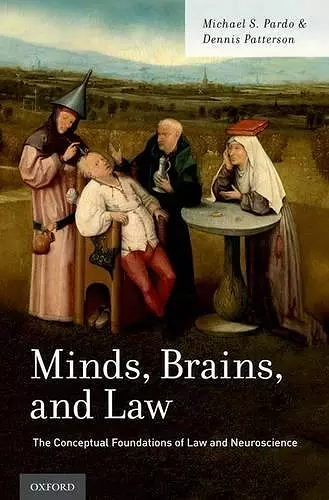Minds, Brains, and Law
The Conceptual Foundations of Law and Neuroscience
Dennis Patterson author Michael S Pardo author
Format:Hardback
Publisher:Oxford University Press Inc
Published:5th Dec '13
Currently unavailable, and unfortunately no date known when it will be back

As neuroscientific technologies continue to develop and inform our understanding of the mind, the opportunities for applying neuroscience in legal proceedings have also increased. Cognitive neuroscientists have deepened our understanding of the complex relationship between the mind and the brain by using new techniques such as functional magnetic resonance imaging (fMRI) and electroencephalography (EEG). The inferences drawn from these findings and increasingly sophisticated technologies are being applied to debates and processes in the legal field, from lie detection in criminal trials to critical legal doctrines surrounding the insanity defense or guilt adjudication. In Minds, Brains, and Law: The Conceptual Foundations of Law and Neuroscience, Michael S. Pardo and Dennis Patterson assess the philosophical questions that arise when neuroscientific research and technology are applied in the legal system. They examine the arguments favoring the increased use of neuroscience in law, the means for assessing its reliability in legal proceedings, and the integration of neuroscientific research into substantive legal doctrines. The authors use their explorations to inform a corrective inquiry into the mistaken inferences and conceptual errors that arise from mismatched concepts, such as the mental disconnect of what constitutes "lying" on a lie detection test. The empirical, practical, ethical, and conceptual issues that Pardo and Patterson seek to redress will deeply influence how we negotiate and implement the fruits of neuroscience in law and policy in the future.
Where the book challenges and then soars is when you get to the parts that go to fundamental and foundational blocks of law (and legal theory), such as the nature of truth and presumptions of the human condition that go to responsibility, agency, and the like. Legal thinking has lagged behind moral philosophy in thinking through or at least thinking about these issues. You will learn a lot and certainly become wiser. * Joseph Weiler, Editor-in-Chief of the European Journal of International Law *
It is a valuable resource for policymakers and scholars in criminal law, constitutional law, and penal theory. I highly recommend this book for all academic law libraries for its in-depth philosophical discussion of neuroscience and legal theory. * Karen Breda, Law Library Journal *
ISBN: 9780199812134
Dimensions: 236mm x 160mm x 23mm
Weight: 590g
272 pages